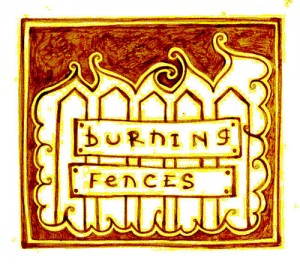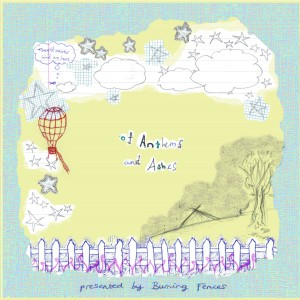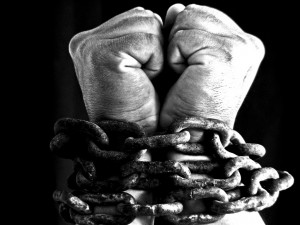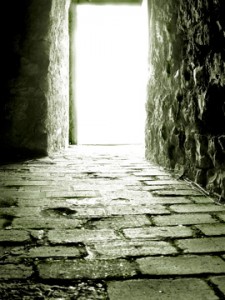
For what page or word of the Bible is not a perfect rule for temporal life?
Isn’t this just about being a Christian?
I sat amongst the emerging community holding the proposed Rule of Life for the possible Society of the Holy Trinity, a New Monastic Society aimed at bringing together communities across the UK (and hopefully further afield) under a common rule and constitution. As we read the prologue to this Rule and reflected on what it said, there was an obvious thing to say,
Isn’t this just about being a Christian?
I had sat with Ian Mobsby, Gareth Powell and others for three days a month before and shared the stories of our different communities as they grew and developed. The Rule of Life, mainly written by one of the communities, had spoken to the other communities represented around the table. In our discussions we were clear that we needed this Rule to be a broad umbrella so that communities from across the Anglican communion may gather under it but it couldn’t be so broad as to lose any definition.
In a paper I was asked to write for the upcoming New Monastic Conference, entitled ‘An Understanding Of Religious Life Based On “New Monasticism: new forms of missional & religious life in the 21st century”’, I attempted to articulate what the New Monastic movement understands by a ‘Rule of Life’.
A Rule of Life is fundamental to the identification with the New Monastic movement. A Rule of Life is not just an agreed statement of belief or purpose but a set of commitments which are formally accepted by way of promises/vows. For all Christians, for every community, every monastery, every intentional grouping, the Gospel is the Rule of our life, the measure of our faithfulness to Christ. In this sense, no other rule is necessary. The tradition of the monastic Rule evolved as the deposit of the Gospel for a particular group at a particular time. Thus intentional communities need to be clear about the way in which they respond to the call of the Gospel. There are many possible ways: a community may feel called to follow a classic Rule; another may have felt called to write a Rule that is, for the members, their invitation to the Gospel life; another may have evolved a covenant document that identifies certain key practices that hold the members in their common vocation. (Ned Lunn, ‘An Understanding Of Religious Life Based On “New Monasticism: new forms of missional & religious life in the 21st century”’, Position Paper for ‘New Monasticism: a UK gathering of new forms of missional and religious life’, 14th April 2016)
With this understanding it is a natural response when reading any Rule of Life to say, ‘but that’s just being a Christian’ but the reality is many Christians struggle to specifically embody the gospel in their lives. The life of faith demands to live and move within context. The Spirit of God does not calls us to live anywhere but calls us to live in the time and place we find ourselves. Jesus lived in history, at a particular time and in a particular culture.
One of the ways in which the Society of the Holy Trinity distinguishes our specific vocation is to acknowledge that we are all communities living in urban contexts. This is not to say that we refuse to engage in the gospel elsewhere but the reality is we experience the life of faith is in the city environment. God has called us to live out the gospel in the City and so we have different questions to ask and a unique perspective on God’s vision for the new creation from communities who exist in the countryside.
I was initially uncomfortable with limiting the Rule of Life of the Society of the Holy Trinity to urban life but God showed me his specific call to bless the city. Living in a context requires us to continually return to the specific questions God asks of us and we must ask of each other. ‘How then shall we live here and now?’ It is easy to lose focus and to shift it from one thing and then to another; a Rule of Life forces us to sit with questions longer than we would naturally.
The Early Church wrestled with the question of context. St Paul argued pragmatically that Christians living in the Hellenistic cities of the Roman Empire as slaves and wives of Greeks or Romans did not have the luxury to distance themselves from the company of Gentiles as the Jewish Christians would want. It was easier for new Christian converts to live the Jewish life in Jerusalem but it was not practical or reasonable to ask those elsewhere to live to that standard. The Early Church discovered the need for some contextual common sense in the discipleship of new Christians.
The danger of context, however, is that we err too far the other way and use the charge of ‘context’ to encourage individualism. There is a risk that by adopting the ‘that’s alright for you but I am different’ subjective approach to life that we are never challenged by the cost of discipleship. There are some who are exploring New Monasticism who feel they can tailor make their own Rule of Life so that it works for their life as it is. When this Rule of Life starts to cost something of our life and comfort, they re-assess and change it to suit new priorities, etc. This makes me feel particularly uncomfortable. A Rule of Life must be shared with others to ensure that iron sharpens iron. That is why, even though there are some parts of the proposed Rule of Life of the Society of the Holy Trinity that I am not keen on, I’m happy to sit with it and would love, in the future, to vow to live by it.
A Rule of Life, like the Bible, demands of us to wrestle with the text and seek to hear God reveal himself through the tangible words. A Rule of Life is a lens we use to help us to hear and understand God’s life-giving story as it calls us to participate in it and it is a lens which we need to share with others to ensure we don’t impose our own agenda and distorted ideas onto it. A Rule of Life must not become an idol, formed into our image, but rather must point us to the revelations of God’s love and grace towards us and the world around us.
Esther de Waal, who I have enjoyed journeying with through the Rule of St. Benedict, puts it beautifully at the end of her book ‘A Life Giving Way: a commentary on the Rule of St Benedict’,
The rule of Benedict is a way of life, a life-giving way. To encounter the text in all its fullness and complexity is like a source and stream, always the same and yet always different, or like a tapestry where I follow first one thread and then another and so get different glimpses of the whole. I return to it time and time again throughout my life. Benedict and his practical manual of the love of Christ are always there to help me on my journey, the coming home of the prodigal to the loving embrace of the father. (Esther de Waal, A Life Giving Way: a commentary on the Rule of St Benedict (New York: Continuum, 1995) p.215)
Reflection
Christianity is not a spirituality because it forces us to embrace our humanness; the fleshy, tangible life. We are not dualists, yearning for the separation of our souls from our bodies. We are not a people focussed on some spiritual nirvana achieved by asceticism or prayerful meditation in the hope of transcending our flesh. We are bodily present, rooted in history and geography, in the world we see, hear and breathe in.
The gospel is about the redemption of the world not an escape route from it. Rowan Williams writes,
The only history to be taken seriously is bodily history; and so the redemption of humanity must be located in bodily history. (Rowan Williams, The Wound Of Knowledge (London: Darton, Longman and Todd, 1990) p.28)
The beautiful revelation of God through Jesus Christ is that God cares for this world and his eschatological plan is bound up in the atoms and particles of creation. The incarnation is good news for us that our earthly lives are not accidental but have a divine purpose: redemption.
The parish system should help us to remember the particularities of our life. Where we live is important. Our neighbours lives demand our attention. The communities of which we are a part are not distractions but the priority of our God who walks that landscape seeking out the lost and proclaiming another world is possible. We can easily forget these truths and realities and that is why a Rule of Life is helpful to hold us in that place of asking the question, ‘how then shall we live?’ How do we live out the gospel in this place at this time? It will be different from those in different contexts but the challenge is, as it has been since the early Christians first discovered God’s vocation given to them by the Holy Spirit at their baptisms, how do we remain united in the demands of different contexts?
Almighty God, through your Holy Spirit you created unity in the midst of diversity;
We acknowledge that human diversity is an expression of your manifold love for your creation;
We confess that in our brokenness as human beings we turn diversity into a source of alienation, injustice, oppression, and wounding. Empower us to recognize and celebrate differences as your great gift to the human family. Enable us to be the architects of understanding, of respect and love; Through the Lord, the ground of all unity, we pray. (“Prayers for Diversity”, Jesuit Resources, http://www.xavier.edu/jesuitresource/online-resources/Prayers-for-Diversity.cfm)
Come, Lord Jesus.


 I have had the privilege of being welcomed into a community over the last year which has had an ongoing and deeply transformative impact on me and my vocation as an ordained priest. The community are mainly in their twenties and would, at a cursory glance, be classified as ‘arty’ intellectual types, although this is not entirely true; not that they are not either of those things but that which unites this group isn’t those two general categories. It is only in the last month or so that I have begun to grasp the ‘charism’, the ‘je ne sais qua’, of Burning Fences.
I have had the privilege of being welcomed into a community over the last year which has had an ongoing and deeply transformative impact on me and my vocation as an ordained priest. The community are mainly in their twenties and would, at a cursory glance, be classified as ‘arty’ intellectual types, although this is not entirely true; not that they are not either of those things but that which unites this group isn’t those two general categories. It is only in the last month or so that I have begun to grasp the ‘charism’, the ‘je ne sais qua’, of Burning Fences. Before I stumbled through the doors one cold December night, this community had been meeting, singing and telling stories for a year or more. They had produced a CD of songs which they had developed entitled ‘Of Anthem and Ashes’. The images that were resonating with them then and remain reverberating through our times together are phoenix like resurrections; songs sung in the rubble, new plants breaking through concrete. These images have always resonated with me and it’s why I know I am a ‘fence burner’.
Before I stumbled through the doors one cold December night, this community had been meeting, singing and telling stories for a year or more. They had produced a CD of songs which they had developed entitled ‘Of Anthem and Ashes’. The images that were resonating with them then and remain reverberating through our times together are phoenix like resurrections; songs sung in the rubble, new plants breaking through concrete. These images have always resonated with me and it’s why I know I am a ‘fence burner’. The times when Church is most frustrating, for me, is in the ‘necessary organization’. What irks me is the lack of convincing Biblical precedent. The Temple system failed and yet here we are in the 21st century rebuilding it. I get it, organic is messy and uncontrollable, unpredictable but it’s how the world functions. We human beings are devastating when we control and tinker with the organic creation. We’ve tried to organize the world and what we discover is we’re trapped in boxes which do not fit nor encourage us to flourish in the ways in which we should.
The times when Church is most frustrating, for me, is in the ‘necessary organization’. What irks me is the lack of convincing Biblical precedent. The Temple system failed and yet here we are in the 21st century rebuilding it. I get it, organic is messy and uncontrollable, unpredictable but it’s how the world functions. We human beings are devastating when we control and tinker with the organic creation. We’ve tried to organize the world and what we discover is we’re trapped in boxes which do not fit nor encourage us to flourish in the ways in which we should.

 Where he came from, neither of them knew. How he got past their captors; who could say? He was either a fraud, one of the warders provoking them for his own amusement; or their captors had fled leaving the cell unguarded; or it was a miracle. None of this mattered much as he walked over to them and spoke.
Where he came from, neither of them knew. How he got past their captors; who could say? He was either a fraud, one of the warders provoking them for his own amusement; or their captors had fled leaving the cell unguarded; or it was a miracle. None of this mattered much as he walked over to them and spoke. Through the doors they saw their guards sleeping soundly. It seemed so strange – no – illogical that they could slumber during a rescue mission in the jail they were meant to watch. The whole incident was feeling so mysterious and implausible; a dream with no reason. Yet this man kept leading them down the corridor towards a bright light; the final exit to freedom.
Through the doors they saw their guards sleeping soundly. It seemed so strange – no – illogical that they could slumber during a rescue mission in the jail they were meant to watch. The whole incident was feeling so mysterious and implausible; a dream with no reason. Yet this man kept leading them down the corridor towards a bright light; the final exit to freedom.